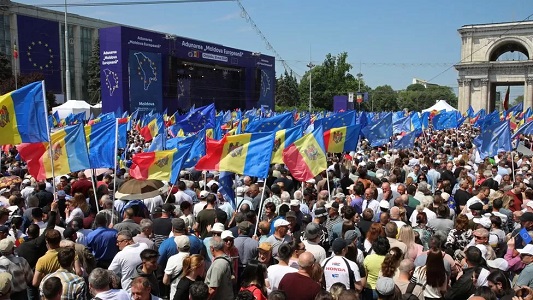

A huge pro-EU rally has taken place in Moldova’s capital Chisinau, organised by the country’s President Maia Sandu.
An estimated 75,000 people turned out to support Moldova’s push to join the European Union.
Her pro-Western government has accused Russia of stoking tensions by supporting Moldova’s pro-Russian opposition Sor party. Moscow denies meddling in the country’s affairs.
Ms Sandu told demonstrators her country no longer wanted to be an outlier.
“We don’t want to be on the outskirts of Europe anymore,” she said, pledging that Moldova would become a European Union member nation by 2030.
Moldova also “does not want to be blackmailed by the Kremlin,” she told the rally, where crowds waved EU flags and chanted pro-European slogans.
In February, Ms Sandu accused Russia of plotting to use foreign “saboteurs” to overthrow her government, saying the plot would involve “protests by the so-called opposition”, aiming to “overthrow the constitutional order”.
Russia’s foreign ministry dismissed the accusations, branding them “completely unfounded and unsubstantiated”.
Moldova, a former Soviet republic which has a population of about 2.6 million, applied last year to join the EU and in June 2022 became a candidate country, alongside Ukraine.
Russia’s invasion of Ukraine has accelerated both countries’ attempts to join the 27-nation bloc – not least because of the protection it offers against any Russian threat.
Moldova has been badly affected by the war, with Russian missiles reported to have crossed into Moldovan airspace on their way to Ukraine, on multiple occasions.
The country, which sits between Ukraine and Romania, is also dependant on Russian gas – something Moscow exploited last year by cutting its supply to Moldova by half.
This sparked protests over the rising price of gas and electricity, which contributed to the resignation of Moldova’s former prime minister Natalia Gavrilita earlier this year.
At the rally on Sunday, European Parliament President Roberta Metsola addressed the crowds, praising them for defying Russian threats to come out in their thousands.
She told the BBC the EU would welcome Moldova “with open arms and open hearts” and that a “Europe with Moldova can be stronger”.
She added that the Moldovan government was “slowly implementing reforms” that the EU wants in place before accession negotiations begin – which include amendments to the justice system and a commitment to “fight corruption at all levels”.
“We’re very impressed, frankly speaking, by the progress so far,” Ms Metsola said.
Analysis by the Pew Research Centre think-tank shows that current EU members were granted candidacy status, on average, 3.5 years after applying.
Ukraine and Moldova’s applications were approved much faster than that, taking less than four months, but it could still take some time for them to get full member status.
BBC/Simeon Ugbodovon
Subscribe to our Telegram and YouTube Channels also join our Whatsapp